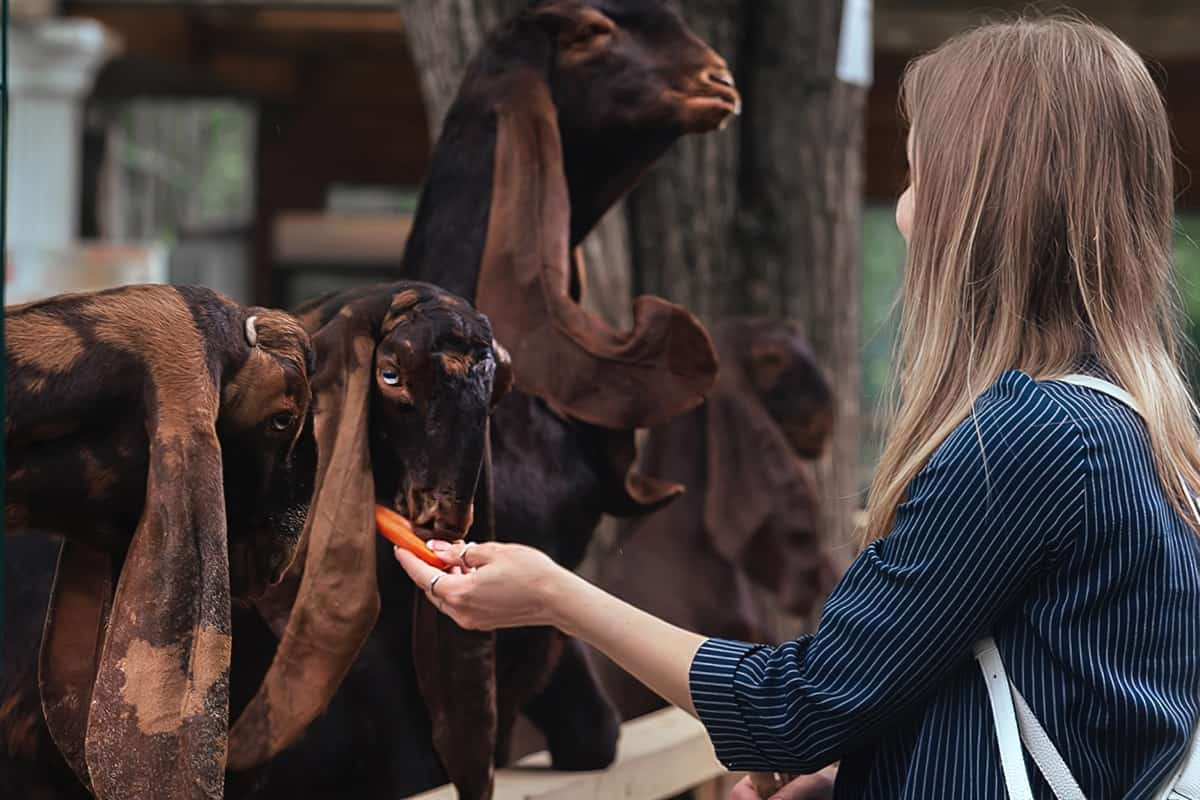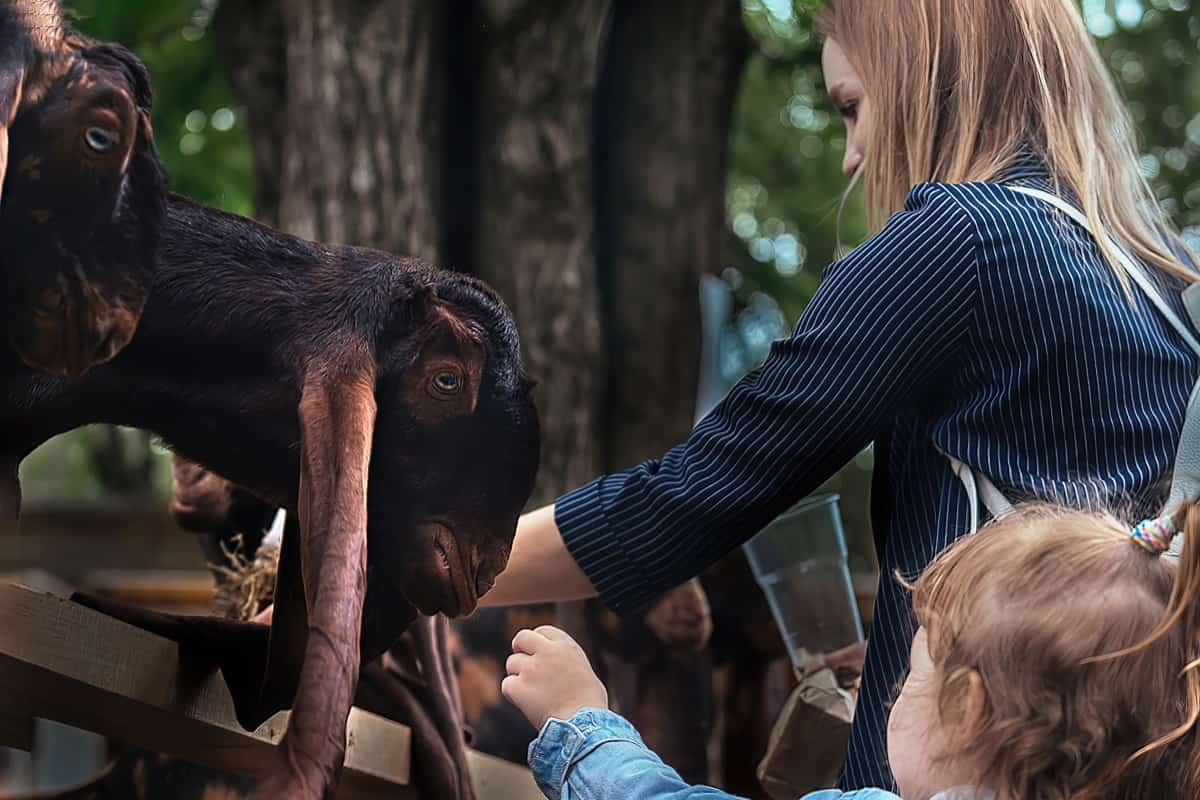The Damascus goat breed, also known as the Shami goat, is a domesticated breed of goat that originated in the Middle East. This breed is highly valued for its unique appearance, adaptability, and milk production capabilities. Let’s take a close look at this goat breed which includes characteristics, price, pros, and cons.

Origin of the Damascus Goat Breed
The Damascus Goat breed, also known as the Aleppo or Shami goat, has a rich history that dates back thousands of years. Originating in the Middle East, specifically in Syria, this breed is well-adapted to the arid and harsh conditions of the region. Its distinctive characteristics include a compact body, a Roman nose, and long, drooping ears.
The Damascus Goat has been bred for its milk and meat production and ability to adapt to various climates. It has gained popularity around the globe due to its high fertility rates and ability to thrive in challenging environments. Today, the Damascus Goat continues to be a valuable breed in the agricultural industry.
Characteristics of Damascus Goats
- With its strong, muscular build, the Damascus goat can climb steep slopes and navigate rugged terrain.
- The most common color is red, but they can also be seen in pied or grey. Typically, they have long hair. Polled or horned, they can be either.
- A fully grown Damascus goat has a long neck and long legs. The size of their heads is relatively small.
- Damascus bucks tend to be larger and heavier than Damascus does. It is estimated that each buck weighs between 70 and 90 kilograms. Doses weigh about 50-60kg on average.
- Damascus goats have large, drooping ears. In hot climates, these ears are thought to help regulate the goat’s body temperature by dissipating heat.
- Damascus goats are known for their thick, woolly coats, which provide insulation during colder weather. Some may have darker patches or markings on the coat, usually white or cream-colored.
- The Damascus goat can browse a wide range of vegetation with its broad, flat nose.
- The Damascus goat has long, curved horns used for defense and foraging. Dark-colored and several feet long, the horns of these animals are usually dark in color.
Price Range of Damascus Goats
The price range of Damascus goats varies based on several factors. Generally, the cost of a Damascus goat ranges from $200 to $800. However, certain factors like age, health, pedigree, and breeding quality can influence the price. Younger goats with good bloodlines and superior genetics tend to be more expensive. Additionally, show-quality Damascus goats with desirable physical characteristics may command higher prices. Overall, the price range for Damascus goats can fluctuate depending on individual circumstances.
In case you missed it: 10 Common Mistakes to Avoid in Goat Farming for Healthy Profits

Size and Growth Patterns of Damascus Goats
These goats have a sturdy build with strong limbs and a well-developed body. Adult males can reach around 80 cm height at the shoulder and weigh between 70-90 kg, while females are slightly smaller. The growth rate of Damascus goats is relatively fast, with kids gaining weight quickly during their first few months. These goats are highly adaptable and can thrive in various climates, making them popular among farmers worldwide.
Pros of Raising Damascus Goats
- The Damascus goat is extremely adaptable to various climates, including arid deserts and lush pastures. Due to their adaptability, they are ideal for farmers from all over the world.
- Sustainable farming practices can be achieved through the use of these goats. They do not require supplementary feeding because they can graze on sparse vegetation.
- The Damascus goat is an excellent milk producer. Various dairy products have been produced from their milk, which is nutrient-rich.
- Moreover, the meat of the breed is lean and tender, which makes it popular with consumers. As a culinary option, it is flavorful and versatile.
- Fabrics and garments made from Damascus goat fiber are of high quality.
- Having developed robust immune systems over centuries of natural selection, these goats are less susceptible to certain diseases.
- As a result of their friendly and sociable nature, Damascus goats are easy to handle and manage.
Cons of Raising Damascus Goats
- Dietary requirements: Damascus goats have specific dietary needs and can be susceptible to health issues if their nutritional requirements are not met, requiring careful monitoring and feeding.
- Space requirements: These goats need ample space to roam and graze, making them unsuitable for small or crowded areas. Providing enough space can be a challenge for many goat owners.
- Market demand: While Damascus goats are known for their meat and milk production, there may be limited demand for their products in some areas, making it challenging to find a profitable market.
- Health issues: Like other goat breeds, Damascus goats are prone to various diseases and issues, which can require veterinary care and increase overall expenses.
Historical Significance of Damascus Goats
The Damascus goat has deep cultural significance in the regions where it has been reared for centuries. It is often said that they represent resilience, adaptability, and a sense of community. Folklore and traditional stories depicting them further highlight their importance in local cultures. Damascus goats have had many uses throughout history, including milk, meat, and fiber. Their wool is highly valued for its softness and warmth, making it ideal for traditional garments and textiles. Even in modern times, these goats hold significance in traditional practices.
Conservation Efforts for Damascus Goats
Genetic diversity and population decline are challenges facing Damascus goats, as they do with many ancient livestock breeds. Several organizations and researchers are working to preserve the breed’s unique characteristics and ensure its survival for future generations through conservation efforts. Various research projects have examined Damascus goats’ genetics, behavior, and adaptability. Furthermore, these studies inform conservation strategies and sustainable breeding practices and deepen our understanding of the breed.
Breeding and Genetics of Damascus Goats
The breeding season for Damascus goats begins in late August and ends in mid-December. At the age of 13 to 16 months, a productive life begins. Similar to other high-yielding breeds, the fertility is medium to high. The breed is highly prolific, giving birth to two babies per kidding on average. Studies have shown that Damascus goats produce twins 50% of the time, but they only do so once a year.
The Damascus goat breeds only once a year. In most cases, natural breeding is preferred. Commercial growers, however, rarely use induced breeding techniques because of modern scientific breeding techniques. It is possible for a healthy buck to breed 30 does. Breeding methods include mass mating, single mating, and artificial insemination.
Health and Care Tips for Damascus Goats
The food provided should be regularly adjusted to the goat’s age, weight, and activity level throughout the day. Forage and fresh water, roughage, concentrates, and mineral supplements, need to be included in a balanced diet. A sheltered, dry, and well-ventilated environment protects Damascus goats from predators and the elements. The goat housing should be spacious enough to accommodate the size of the herd and provide adequate space for the goats to move around and lie down.
In case you missed it: 10 Best Goat Breeds for Pets: Popular Choices for Pet Owners

The bedding should be cleaned, dried, and changed regularly to prevent buildup of manure and bacteria. For Damascus goats to remain healthy, regular medical care is essential. Routine vaccinations, dewormings, and veterinary checkups are included in this. Observe the goats closely for signs of illness or injury, and seek medical attention immediately.
Maintaining the health and cleanliness of Damascus goats requires regular grooming. Trimming their hooves, brushing their coats, and checking for parasites and diseases are all part of this routine. It is also a great opportunity to bond with the goats and observe any changes in their behavior or health while grooming.
Conclusion
The Damascus goat continues to be highly valued by farmers and breeders worldwide. Efforts to preserve the genetic purity of this breed are essential to maintain its exceptional traits and ensure its long-term survival.
- Ultimate Guide to Ossabaw Island Hog: Breeding, Raising, Diet, and Care
- Ultimate Guide to Juliana Pig: Raising Facts, Size, Diet, Care, and Lifespan
- Raising Lleyn Sheep: Disadvantages, Price, Uses, Characteristics, and Care
- Ultimate Guide to Meishan Pig: Breed Facts, Breeding, Raising, and Care
- Ultimate Guide to Teacup Pigs: Raising, Diet, Lifespan, Cost, and Care
- Guide to Raising Poll Dorset Sheep: Facts, Profile, Characteristics, Uses, and Care
- Ultimate Guide to Bighorn Sheep: Characteristics, Diet, Lifespan, Breeding, and Lifecycle
- Ultimate Guide to Raising Katahdin Sheep: Farming Facts, Breed Profile, Uses, and Care
- Ultimate Guide to Raising Oreo Cows: Belted Galloways Farming Facts, Profile, Uses, and Care